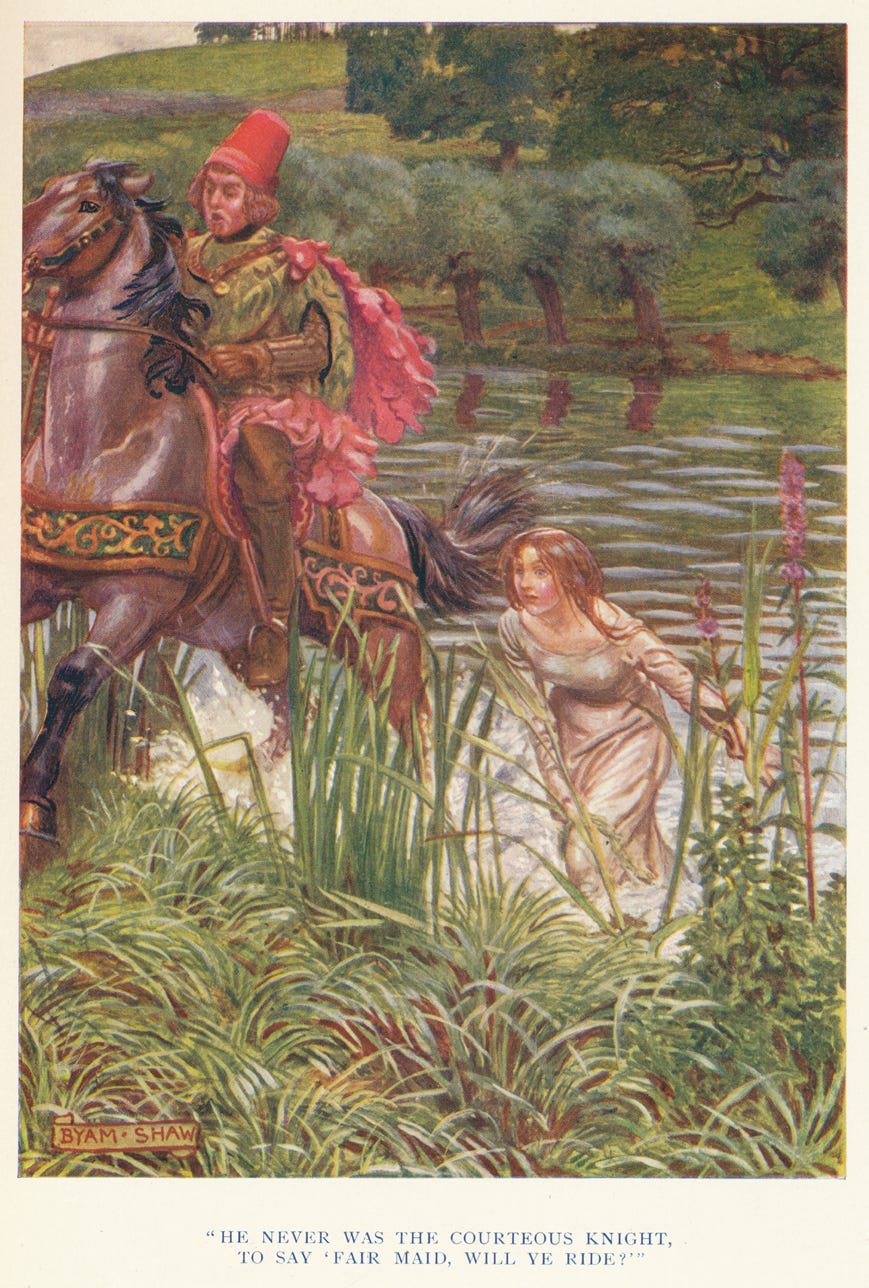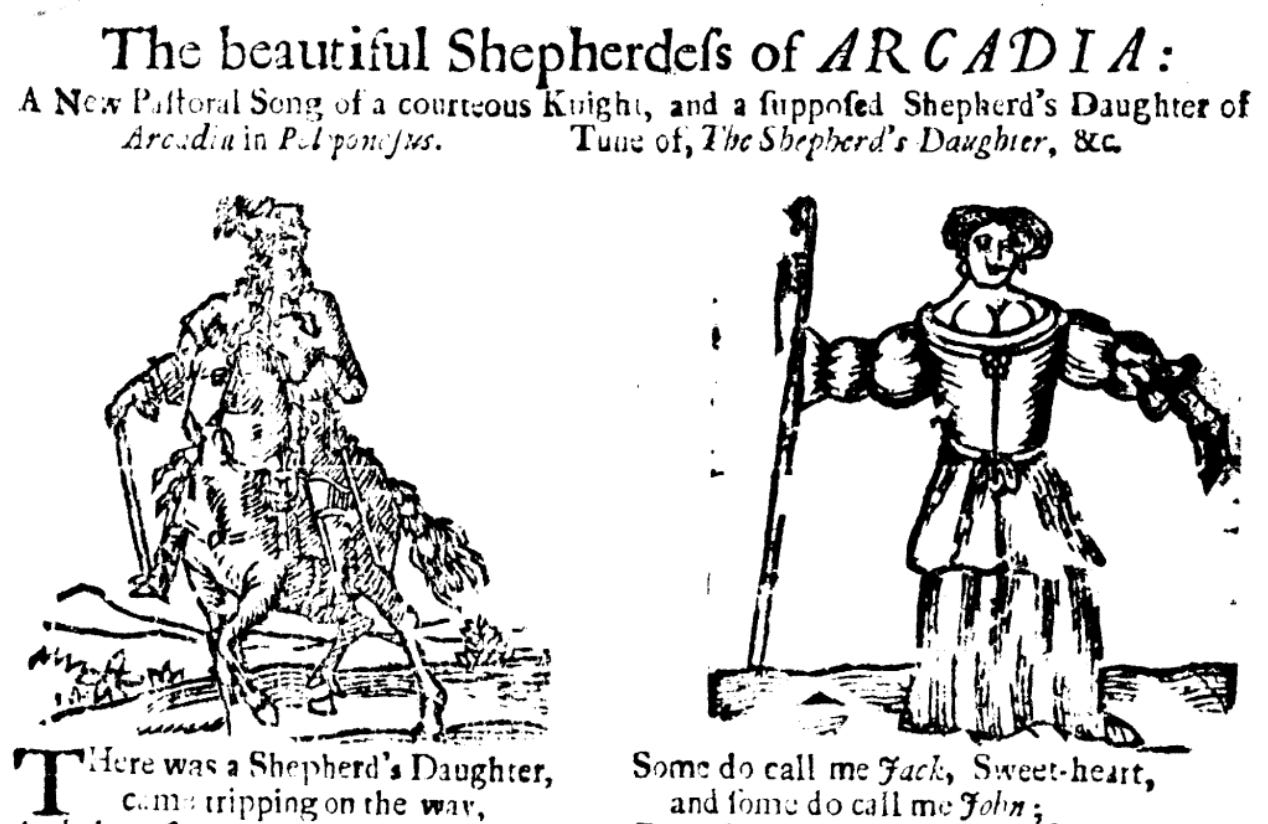ROUD 67: The Knight & the Shepherd's Daughter
The Shepherd's Daughter, Earl Richard, The Beautifull Shepherdesse of Arcadia, Shepherd's Dochter, Earl Richard, Earl Lithgow, Earl Richmond, Sweet William, The Royal Forester

This ballad bears some comparison to Child Waters (Roud 43), at least in the reprehensibly indifferent behaviour of the man towards the woman whom he has in its most charitable form, “laid down in the woods with” (an overly polite euphemism for the alarmingly perfunctory sexual assault that often is dropped unceremoniously into the first verse of the song). The ensuing heroic feats of determination of the woman to track down her assailant could be spun as some sort of positive, but once again also starkly demonstrates the woefully limited options available to women who bore children out of wedlock in those times.
Music
Here is the playlist, not including many of the Percy Grainger arranged instrumental piano versions.
We have a few early source recordings, some of which can be found in the playlist above. Here’s another treasure from the vaults of the British Library, recorded in a Suffolk pub in 1960 by Desmond and Shelagh Herring, sung by Charlie Carver (starts at 12 minutes):
https://sounds.bl.uk/sounds/the-knight-and-the-shepherds-daughter-1001673582190x00000d
Over on Bandcamp you can find the brilliant Nick Hart’s dark and atmospheric interpretation of the same source - always fascinating to see how a song can evolve in one short step.
Finally here is a lovely version that was originally collected in Nova Scotia by Helen Creighton, sung here by John Roberts and Tony Barrand in 1971.
Read on for more about Creighton and the singer she recorded singing this song.
Helen Creighton & Nathan Hatt
Sometimes folk song collectors from the past took the form of intrepid pioneers, roving from Sussex pub to Appalachian mountain shack and back again, filling their knapsacks with a diverse range of song and folk culture. Others however were hyper-local in their approach, devoting their lives to the comprehensive documentation of a particular area. One fine example of the latter was Helen Creighton, who collected songs and stories in her native Novia Scotia from 1942 until the 1970s, amassing around 4000 ballads and songs. In some ways this forensic local searching will have more long term value, although like many collectors, she did not regard anything bawdy and political to be of interest, so we still do not have the full picture. However, we must still be grateful for her persistence and reportedly extremely persuasive manner that coaxed so many songs from people uninterested in, and possibly intimidated by, being recorded for posterity. It’s an incredible legacy, including a lovely version of The Knight and the Shepherd’s Daughter sung by Nathan Hatt. Following are a couple of interesting videos, some of which show the collection in progress (or slightly stilted recreations of it - you decide).
Unfortunately the sound clip of Nathan Hatt singing The Knight and the Shepherd’s Daughter has not been published in digital form yet, although I am assured by the Helen Creighton Society that it will all be available soon via the Nova Scotia Archives website. In its stead, here’s a lovely fragment of him singing “Lincoln was a Mason”, a version of Roud 6, more commonly known as Long Lankin - and also a demonstration of Creighton’s methods of getting the absolute maximum from her singing charges:
Creighton wrote a fascinating and touching article about Hatt in 1953 for the Dalhousie Review (a newsletter from Dalhousie University in Novia Scotia).
Tip of the hat(t) to their archiving team, as it can be read in full here.
Sources
The Abbotsford collection of Scottish Poetry published in 1893 mentions this ballad, under the “Earl Richard” title.
It mentions the Scottish prevalence of the ballad, and also a tantalising fact that a 1719 historical text “Gul. Neubrigiensis Historia” mentions that the ballad was popular in the time of Queen Elizabeth. I will have to take that on trust as the book in question is written entirely in Latin, as you can see here.
As ever, Frank Sidgwick (1903) provides a nice overview.
And finally, legendary chronicler of the Yorkshire folk landscape Frank Kidson found a fascinating version from Leeds, with the lovely detail that the song was recorded as having been sung by mill girls who would ride funfair “fly boats” in their presumably precious little time off.
Draft pages and audio guide
Keep reading with a 7-day free trial
Subscribe to Sing Yonder: A Practical Guide to Traditional Song to keep reading this post and get 7 days of free access to the full post archives.








